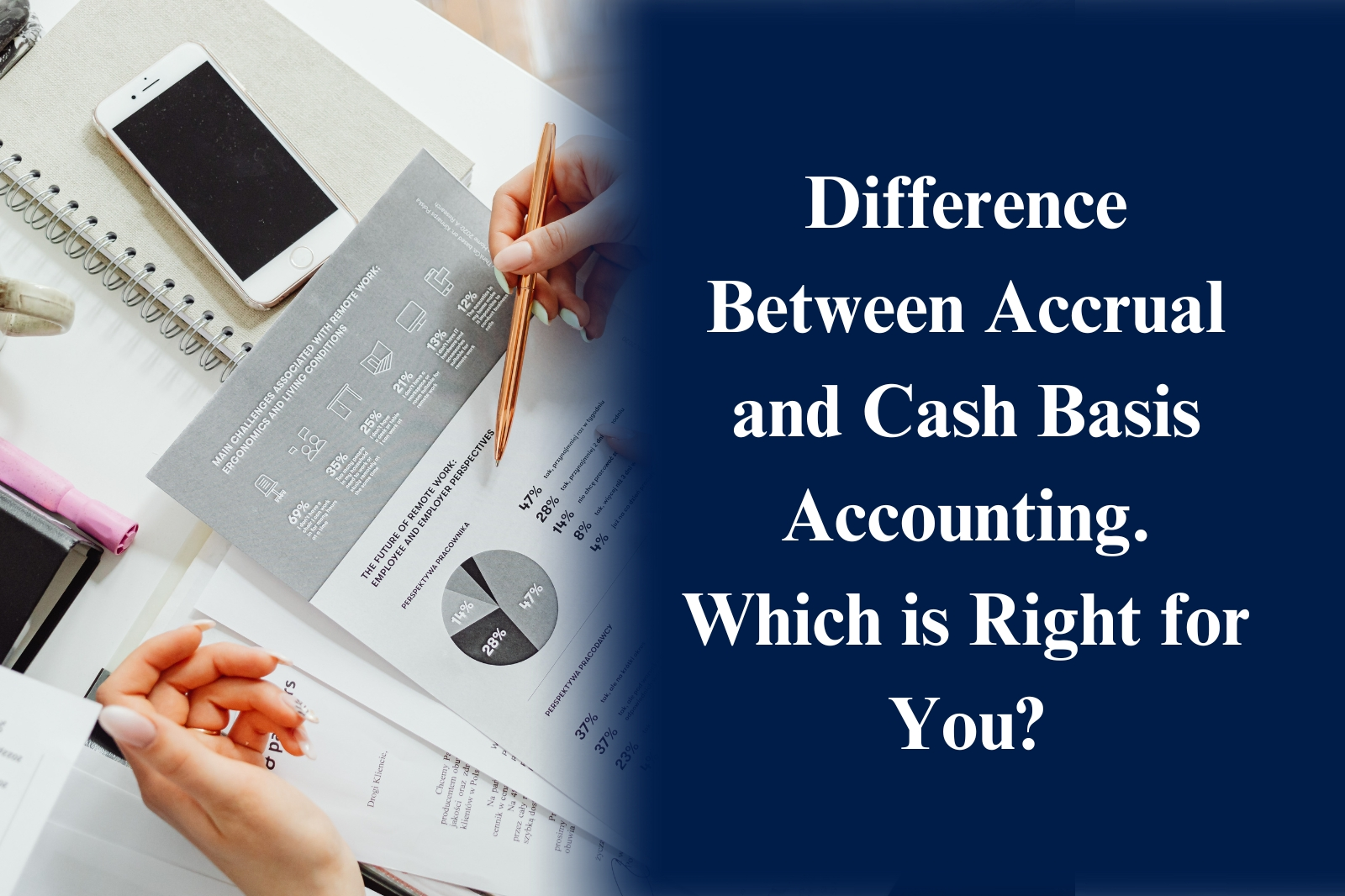Accrual accounting and cash basis accounting are two different methods for tracking money in a business. One of the first choices a company has to make is choosing the proper accounting method. Companies use Accrual and cash basis to record income and expenses in different ways. Accounting is an important part of your business, regardless of its size. Accounting helps owners to the track of money, profit and help make better decisions.
Businesses get a more clear financial picture with accrual accounting, while small businesses prefer cash basis. Each accounting method helps you in the financial matters of your businesses and helps you build trust with authorities. You need to understand both accounting methods and choose one that fits your business size and future goals.
What is Cash Basis Accounting?
Cash basis accounting records income and expenses only when a company pays or receives the money. So if a customer pays you today, you can record it for the same day. Similarly, if you are paying a supplier, you will record the expense for the same day, not when you receive the goods. Cash basis accounting is straightforward to use. The Cash basis accounting doesn’t require tracking invoices or payments that haven’t been made yet. Most small businesses prefer this method because it shows the actual money in the bank.
Advantages of Cash Basis Accounting
- Simple to Use.
- Clear cash flow picture.
- Low cost.
- Suitable for small businesses.
- No need to track invoices or payables.
Disadvantages of Cash Basis Accounting
- Not accurate over time.
- It can mislead financial health.
- Limited for long-term planning.
- Not accepted for tax.
- Challenging to get loans or investors.
What is Accrual Basis Accounting?
Accrual basis accounting record revenues and expenses before receiving the payments. It helps show the real performance of the businesses. If you complete any job and send an invoice, you record the income for it even if the client pays you a month later. The exact process is for expenses; if you receive a service but pay later, you still record the cost now. Accrual basis accounting is good for large businesses that deal with credit, multiple clients and long term contracts. But it is complex and needs professional help to manage it properly.
Advantages of Accrual Basis Accounting
- More accurate.
- Good for growth.
- Better for tax reporting.
- Helps in planning.
- More professional.
Disadvantages of Accrual Basis Accounting
- More complex.
- Can be costly.
- Doesn’t reflect real-time cash.
- Harder for beginners.
- Needs consistent updates.
Differences Between Accrual and Cash Basis Accounting
Here’s how cash and accrual accounting differ.
Timing of Revenue & Cost Recognition
Cash basis recognizes revenue when cash is physically collected, while accrual basis recognizes the profit at the time of earning it. Expenses are also recorded under the cash method. When the payment is made, this typically occurs when the services or products are received, regardless of the timing of the cash payment. Furthermore, the cash method records the expenses when payment is made, whereas accrual accounting records them when they happen, not when they are paid or received.
Complexity
Cash basis accounting is simple, and the process is more straightforward to perform as it does not need comprehensive record keeping or complicated accounting systems. On the other hand, accrual is complex and requires robust systems to track your debts and credits.
Following the Matching Principle
Accrual accounting follows the matching principle, which means it records the expenses in the same period as the revenues to contribute to earnings. This approach depicts a more accurate picture of a company’s financial performance. Cash base does not follow this approach.
Monitoring Credits & Debts
Accounts payable and receivable are an essential part of accrual accounting. It shows how much customers owe you and how much you owe to suppliers. Cash accounting does not use these, as it records the cash at the time of cash exchange, hence, there are no outstanding receivables or payments.
Impact on Long-Term Contracts
Accrual accounting offers deep financial knowledge for companies involved in long-term contracts, such as software development and construction. It shows revenues and expenses as the project develops. You do not have to wait for years to collect revenue under the cash basis accounting; accrual allows you to recognize the revenue gradually during the duration of a long-term contract.
Compliance with Regulations
Regulatory compliance is mandatory according to the authorities, and the use of accrual accounting is required if they’re above a specific size or revenue threshold. This requirement exists because accrual accounting shows a clear image of a company’s financial performance. Although small companies can use cash-based accounting, it is not suitable for audited financial reports or filing under IFRS or GAAP.
Impact on Tax Liabilities
The method of accounting has significant implications for tax liabilities. Under the cash accounting approach, income is taxed after it is received, and expenses are deductible when they’re paid. It helps with the management of taxable income, as business owners can delay the depositing of a check to shift the recognition of the revenue to the next period.
Recording Unearned Income
Under accrual accounting, if a customer pays in advance for goods and services, the payment is an unearned revenue or a liability until the company delivers the product or service. On the other hand, cash accounting recognizes the payment as revenue right away. It overlooks the fact that the company has to fulfill its promise to the customer.
Handling Accurals & Deferrals
The accrual approach uses accruals and deferrals to ensure the record of income is done at the correct time. It covers earned wages that are not yet paid, or earned interests that are not yet received. Deferrals consist of payments made or received in advance, like prepaid costs and income received before it is earned. Both entities help companies to record financial activity before the occurrence of cash transactions.
Buying big items
In accrual accounting, the cost of big purchases like machinery is spread over several years while cash accounting records the full price on the day of purchase.
Which Businesses Should Use Cash Basis?
Cash basis accounting is ideal for small businesses, freelancers, or solo entrepreneurs with limited transactions. If you are someone who has just started and wants to keep things simple, cash basis accounting works well for you. You can easily track your cash flow, and it also doesn’t require complex record keeping also may not require an accountant and financial team, and how much cash is available at any moment. But once your business grows and you start giving credit to customers or make any future commitments, cash basis accounting will be too basic and less functional.
When to Choose Accrual Basis Accounting?
Once your business is fully grown, it will require accrual basis accounting. On an accrual basis, you will be fully aware of your business’s financial position. Businesses with employees, inventory or long term projects prefer accural basis accounting. The accrual accounting method helps you plan more effectively, match revenues with expenses and gives banks and investors a realistic view of your financial status. If you are applying for loans accural accounting can also help you at that time. In the UAE, most companies follow an accrual basis method to stay compliant with tax rules and financial reporting standards.
Impact on Tax Reporting in the UAE
Under the UAE corporate tax law, businesses must follow internationally accepted accounting principles, which generally means using the accrual basis accounting method. It provides a fair view of a company’s financial activities. Small businesses that are using cash basis accounting may be allowed in some cases, such as those with revenue below a specific limit but still you need to get that checked with tax experts and Federal Tax Authority (FTA). Your tax filings can be accurate and you can avoid penalties, if you are choosing the proper accounting method for your business.
Switching Between Methods
As the business grows over time, it changes its accounting methods. In the UAE, you need to inform tax authorities if you are moving from cash to accrual accounting. Also, you may require approval depending on the tax status of your business. The goal of switching the accounting method is to ensure accuracy in your finances.
Finale
One of the very first decisions for every business is to choose between cash basis or accrual basis accounting. Cash basis accounting works well for small businesses with fewer transactions. Accrual basis accounting offers a clear and indetailed financial picture. Accrual basis accounting is generally preferred due to corporate tax requirements and international standards. If you need support with accounting matters, Al Riyady is here to guide you every step of the way.





